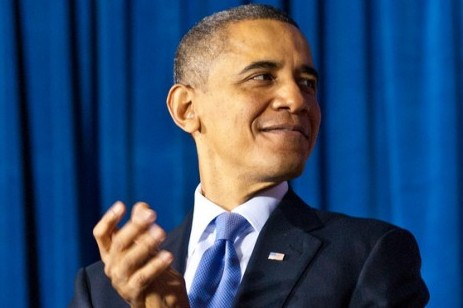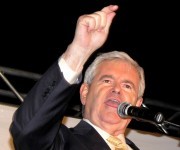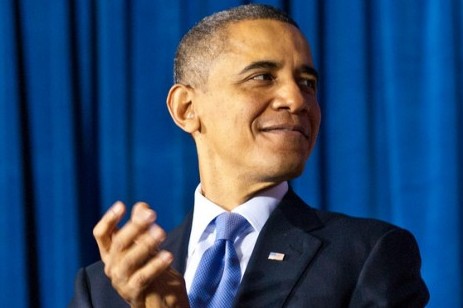 Photo: White HousePresident Obama dedicated a chunk of his State of the Union speech on Tuesday night to greentech and clean energy. He called for 80 percent of America’s electricity to come from clean sources by 2035 — though he offered no specifics on how this might get done, and his definition of “clean” included natural gas and “clean coal.”
Photo: White HousePresident Obama dedicated a chunk of his State of the Union speech on Tuesday night to greentech and clean energy. He called for 80 percent of America’s electricity to come from clean sources by 2035 — though he offered no specifics on how this might get done, and his definition of “clean” included natural gas and “clean coal.”
Michael Levi of the Council on Foreign Relations said the proposal “looks more ambitious, at least for the electricity sector, than the climate bills that failed last year. Grist’s David Roberts points out that the plan is really a call for less coal.
Obama also called for cutting billions in subsidies to oil companies: “I don’t know if you’ve noticed, but they’re doing just fine on their own,” he said. And he set a goal of putting a million electric vehicles on the roads by 2015. No mention was made of “climate” or “global warming.”
As part of a pitch for building up infrastructure, Obama called for 80 percent of Americans to have access to high-speed rail within 25 years.
Best of all, he made a salmon joke!
Here’s the part about energy and cleantech:
The first step in winning the future is encouraging American innovation. …
We’ll invest in biomedical research, information technology, and especially clean energy technology — an investment that will strengthen our security, protect our planet, and create countless new jobs for our people.
Already, we are seeing the promise of renewable energy. Robert and Gary Allen are brothers who run a small Michigan roofing company. After September 11th, they volunteered their best roofers to help repair the Pentagon. But half of their factory went unused, and the recession hit them hard.
Today, with the help of a government loan, that empty space is being used to manufacture solar shingles that are being sold all across the country. In Robert’s words, “We reinvented ourselves.”
That’s what Americans have done for over two hundred years: reinvented ourselves. And to spur on more success stories like the Allen Brothers, we’ve begun to reinvent our energy policy. We’re not just handing out money. We’re issuing a challenge. We’re telling America’s scientists and engineers that if they assemble teams of the best minds in their fields, and focus on the hardest problems in clean energy, we’ll fund the Apollo Projects of our time.
At the California Institute of Technology, they’re developing a way to turn sunlight and water into fuel for our cars. At Oak Ridge National Laboratory, they’re using supercomputers to get a lot more power out of our nuclear facilities. With more research and incentives, we can break our dependence on oil with biofuels, and become the first country to have 1 million electric vehicles on the road by 2015.
We need to get behind this innovation. And to help pay for it, I’m asking Congress to eliminate the billions in taxpayer dollars we currently give to oil companies. I don’t know if you’ve noticed, but they’re doing just fine on their own. So instead of subsidizing yesterday’s energy, let’s invest in tomorrow’s.
Now, clean energy breakthroughs will only translate into clean energy jobs if businesses know there will be a market for what they’re selling. So tonight, I challenge you to join me in setting a new goal: by 2035, 80% of America’s electricity will come from clean energy sources. Some folks want wind and solar. Others want nuclear, clean coal, and natural gas. To meet this goal, we will need them all — and I urge Democrats and Republicans to work together to make it happen.
And the part on infrastructure and rail:
To attract new businesses to our shores, we need the fastest, most reliable ways to move people, goods, and information — from high-speed rail to high-speed internet.
Our infrastructure used to be the best — but our lead has slipped. … Countries in Europe and Russia invest more in their roads and railways than we do. China is building faster trains and newer airports. Meanwhile, when our own engineers graded our nation’s infrastructure, they gave us a “D.” …
Within 25 years, our goal is to give 80% of Americans access to high-speed rail, which could allow you go places in half the time it takes to travel by car. For some trips, it will be faster than flying — without the pat-down. As we speak, routes in California and the Midwest are already underway.
And the salmon humor. When talking about the need to streamline government, he said:
Then there’s my favorite example: the Interior Department is in charge of salmon while they’re in freshwater, but the Commerce Department handles them in when they’re in saltwater. And I hear it gets even more complicated once they’re smoked.
Heh heh.



